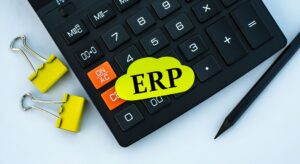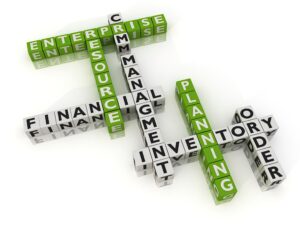Features of ERP Software
ERP (Enterprise Resource Planning) software typically includes many features to help businesses manage various aspects of their operations. The specific features included in an ERP system can vary depending on the vendor and the industry for which the system is designed, but here are some standard features:
- Financial Management: This module includes features such as accounts payable and receivable, general ledger, billing, and invoicing.
- Inventory Management: This module helps businesses manage inventory levels, track stock movements, and optimize their supply chain.
- Procurement Management: This module allows businesses to manage purchasing, from creating orders to tracking supplier performance.

- Sales and Marketing Management: This module includes customer relationship management (CRM), sales forecasting, and order management.
- Human Resources Management: This module includes payroll, benefits administration, time and attendance tracking, and performance management.
- Project Management: This module allows businesses to manage projects from start to finish, including planning, scheduling, and resource allocation.
- Business Intelligence and Reporting: This module provides businesses with analytics and reporting tools to help them make data-driven decisions.
- Supply Chain Management: This module helps businesses optimize their supply chain by tracking inventory levels, managing logistics, and improving supplier relationships.
- Production Planning and Control: This module helps businesses manage the manufacturing process, from planning and scheduling to quality control.
- Manufacturing: This ERP Software feature will be included for managing production processes, quality control, and maintenance management.
- Customer Relationship Management: This ERP software feature helps manage customer data, sales processes, and customer service.

These are just some of the many features that ERP software can include. The specific features included in a system will depend on the needs of the business and the vendors providing the software. ERP Software is business management software designed to help organizations’ core business processes more efficiently and integrate. Some of the key features of ERP software include.
- Integration: ERP Software integrates all the different business processes of an organization, such as finance, accounting, inventory management, sales, and HR, into a single unified system.
- Customization: ERP Software can be customized to meet an organization’s specific needs, such as industry-specific requirements or unique business processes.
- Automation: ERP Software automates many routine tasks, such as generating reports, managing inventory levels, and processing payroll, which helps to improve efficiency and reduce errors.

- Scalability: ERP Software is designed to be scalable, meaning it can be easily expanded or adapted as an organization grows or change over time.
- Reporting and Analytics: ERP Software provides advanced reporting and analytics capabilities, allowing organizations to gain insights into their business performance and make informed decisions.
- Cloud-Based: Many ERP Software solutions are now cloud-based, meaning they are accessible from anywhere with an internet connection and require no on-premises hardware or software installation.
- Mobile-Friendly: ERP Software is often designed to be mobile-friendly, allowing users to access important information and perform tasks from their mobile devices.
- Security: ERP Software is designed with robust security features to protect sensitive business data from unauthorized access and system insiders.
ERP Software is a powerful tool for organizations looking to streamline their business processes, improve efficiency, and gain deeper insights into their operations.
Security Features of ERP Software
Given that ERP software is a critical system that handles sensitive business data, it’s essential to implement robust security measures to protect against system insiders and data breaches. Here are some of the ERP software security features commonly found in ERP Software:
- Role-based access control: This security feature allows administrators to control who has been accessible to specific data and functionalities within the ERP system. Each user is assigned a specific role, and access is granted based on the utilizer’s role and responsibilities.
- Encryption: Encryption is used to secure data in transit and at rest. The ERP software should utilize encryption protocols, such as SSL to protocol, data as it’s transmitted during the different systems or stored in a database.

- Two-factor authentication: Two-factor authentication adds an extra layer of security by requiring utilizers to provide two forms of identification, such as a password and a token or biometric data, to access the ERP software system.
- Audit-Trails: An audit trail record all actions performed within the ERP software system, including who accessed what data and when. This feature helps administrators track changes to the ERP software system and detect potential security breaches.
- Firewalls: A firewall is a network security system that monitors and controls incoming and outgoing network traffic. ERP software systems should have firewalls to protect against unauthorized access and system insiders.
